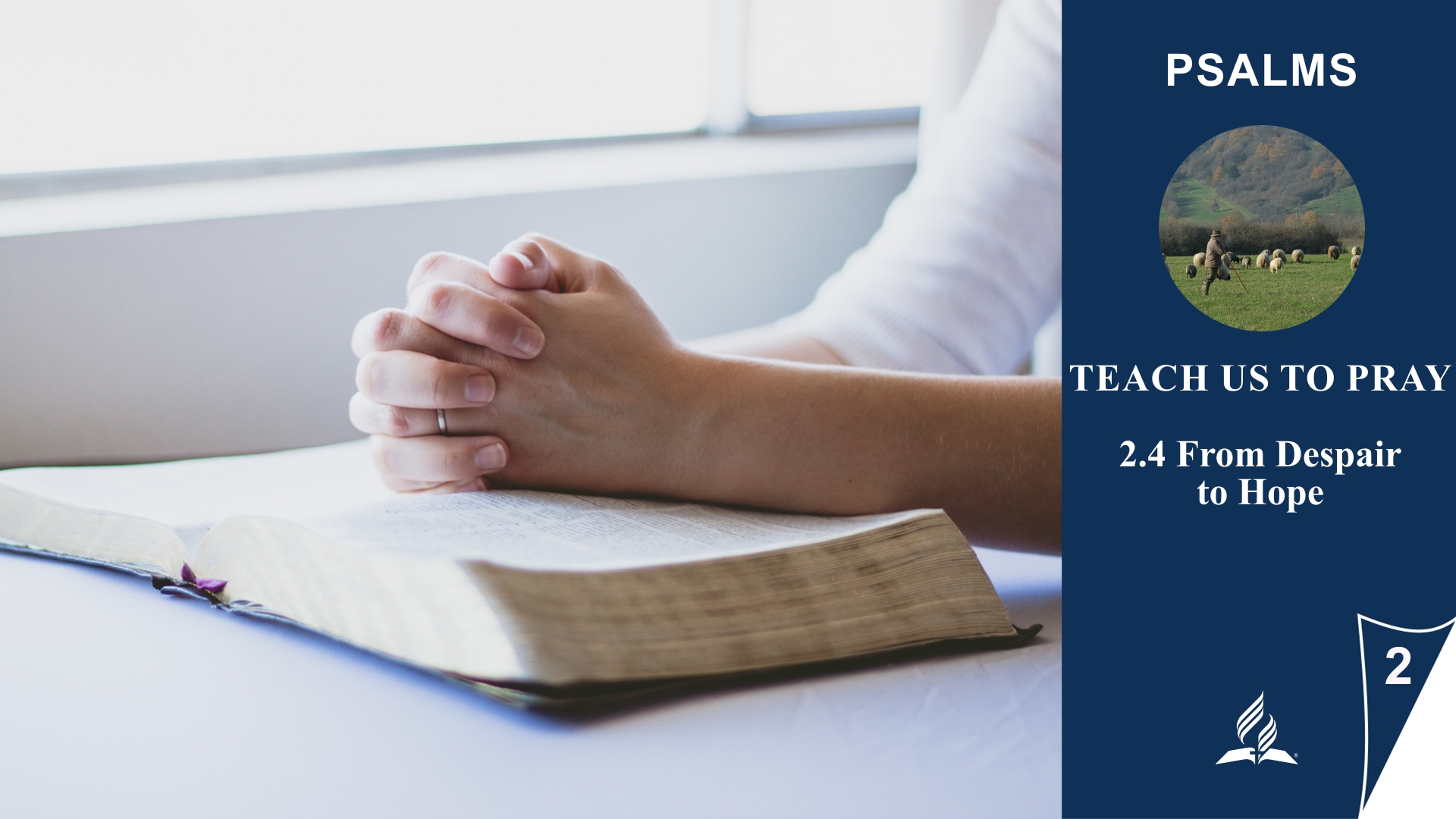Lesson 2: Teach us to Pray | 2.4 From Despair to Hope


2.4 From Despair to Hope
Read Psalm 13. What two basic moods can you discover in this psalm? In your opinion, what decision has caused the radical change in the psalmist’s overall attitude?
Psalm 13 demonstrates two fundamental moods or sections:
-
Lament and Despair (Psalm 13:2-4):
-
The first four verses express deep despair and lament. The psalmist feels forgotten and abandoned by God. The repeated question “How long?” reflects the urgency and pain of the situation. The psalmist wrestles with fear, worry, and the sense of God’s absence.
-
-
Trust and Praise (Psalm 13:5-6):
-
The final two verses of the psalm mark a radical shift in the psalmist’s attitude. Here, we see a decision by the psalmist to place trust in God’s redeeming power. He acknowledges that God has saved him, and his fear gives way to confidence. The psalm concludes with an expression of praise and hope.
-
The radical change in the psalmist’s overall attitude seems to be characterized by his conscious decision to trust in God’s redeeming power. Instead of solely focusing on his own problems, the psalmist shifts attention to God’s faithfulness and loving care for His people. This change in perspective leads to a transformation of thoughts and emotions.
The decision to trust God and acknowledge His redeeming power brings about a shift from fear to hope, from lament to praise. This decision also highlights the importance of consciously changing one’s perspective in prayer and recalling God’s promises.
The concluding remarks on the significance of praying the Psalms emphasize the need not only to repeat the words but also to seek a deep understanding of their meaning and apply them personally in life. The Psalms are not merely conveying information but are intended to bring about a change in the nature and actions of believers. Through God’s grace, the Psalms reveal their promises in the lives of believers, offering a pathway to transformation and union with Christ.
How can your difficulties bring you closer to God? Why can they, if not careful, lead you away from Him?
How difficulties can bring you closer to God:
-
Dependency on God:
-
In the midst of difficulties, many people recognize their limitations and dependence on God. This can lead to a more intense search for God’s guidance and support.
-
-
Seeking Meaning and Comfort:
-
Difficulties often raise questions about the meaning of life and the origin of suffering. This can prompt people to ask spiritual questions and seek comfort in their relationship with God.
-
-
Renewal of Faith:
-
In times of crisis, people may reassess and deepen their faith. Difficulties can lead to a greater openness to the spiritual dimension of life.
-
-
Community and Support:
-
Difficulties can prompt individuals to seek community and support. Church fellowship and faith can become sources of encouragement and assistance in such moments.
-
-
Changing Priorities:
-
During challenging times, people often realize that worldly priorities and goals are not ultimately fulfilling. This can result in a realignment toward spiritual values and priorities.
-
Why difficulties can lead you away from God:
-
Doubt and Alienation:
-
Difficulties can trigger doubts about God’s goodness and existence. If these doubts are not addressed, they may lead to alienation from God.
-
-
Bitterness and Resentment:
-
Deep hurts caused by suffering and injustice can lead to bitterness and resentment. These negative emotions can impact one’s relationship with God.
-
-
Self-Pity and Resignation:
-
Prolonged difficulties may lead to self-pity and resignation. If people feel that God is not intervening, they may turn away from Him.
-
-
Seeking Worldly Solutions:
-
Instead of relying on God, individuals in times of hardship might intensify their search for worldly solutions and pleasures to cope with their difficulties.
-
-
Lack of Spiritual Support:
-
If individuals do not receive adequate spiritual support during difficult times, they may feel abandoned and potentially drift away from God.
-
It is essential to emphasize that the response to difficulties varies from person to person. A conscious pursuit of a deeper relationship with God, seeking spiritual community, and engaging with spiritual questions can help ensure that difficulties draw individuals closer to God rather than pushing them away.
Visited 40 times, 1 visit(s) today
Post Views: 673






